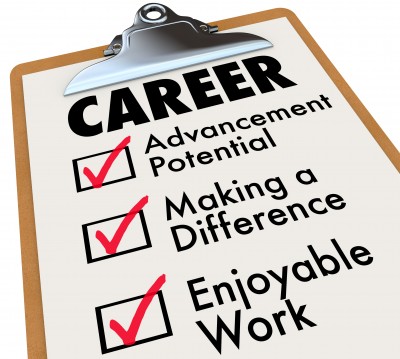
03 Jan
Self Assessment To Go – A Career Change Checklist
Choosing a career is a big decision. A decision that should involve more than thumbing through a book or newspaper and picking a job that sounds kind of interesting.
While your next job will probably not be your last job, you will be spending many hours each week at the office. If you’re working full-time you will be spending more time with your co-workers than with your family.
Considering the time-on-the-job-factor alone, it’s important to at least like your job. Before begining a job search, consider your answers to these questions.
- What skills do you want to use on the job? Which adaptable, transferable and job-related skills?
- What type of people do you want to work with? Strong, assertive individuals? Creative sorts?
- What type of atmosphere do you function best in? Relaxed, easy-going? Fast-paced, goal-oriented?
- How much responsibility are you prepared to accept? Do you want to be responsible for the work of others?
- Do you prefer a structured workday or are you fairly adaptable?
- Are you more comfortable with close supervision? Do you like having the option of prioritizing your own work?
- Do you like to work independently or as part of a team?
- What type of environment do you want to work in? Do you like quiet? Do you need to be near a window?
- What population do you want to work with? Adults, children, the elderly, those with special needs?
- What hours do you want to work? Are you a 9 to 5er? Do you need a part-time, flexible schedule? What about working on the weekends?
- How much money do you want/need to make? Are benefits important to you? (This includes vacation time, holiday pay and medical benefits.)
- What is important to you? What values or ideals would you like to further in the work that you do? (This may include cleaning up the environment, making money, helping others, gaining prestige, etc.)Realize that you may be forced to choose one value over another when they conflict.
Take your time. Think carefully about each answer. Be sure to write specific rather than vague statements.
Use the information in these answers to write a brief, concise statement describing what you want to do on your next job. A statement means one or two sentences, not an essay.
This statement should be open-ended enough to include a few different positions, but specific enough to exclude more jobs than it includes, i.e. a part-time entry-level clerical position is too general.
A better example is: A part-time, entry-level clerical position working with special-needs children in a relaxed, casual atmosphere with a flexible schedule.
Take your time with this exercise. While this may not be your career for the next twenty years, your job will be a major part of your life.
